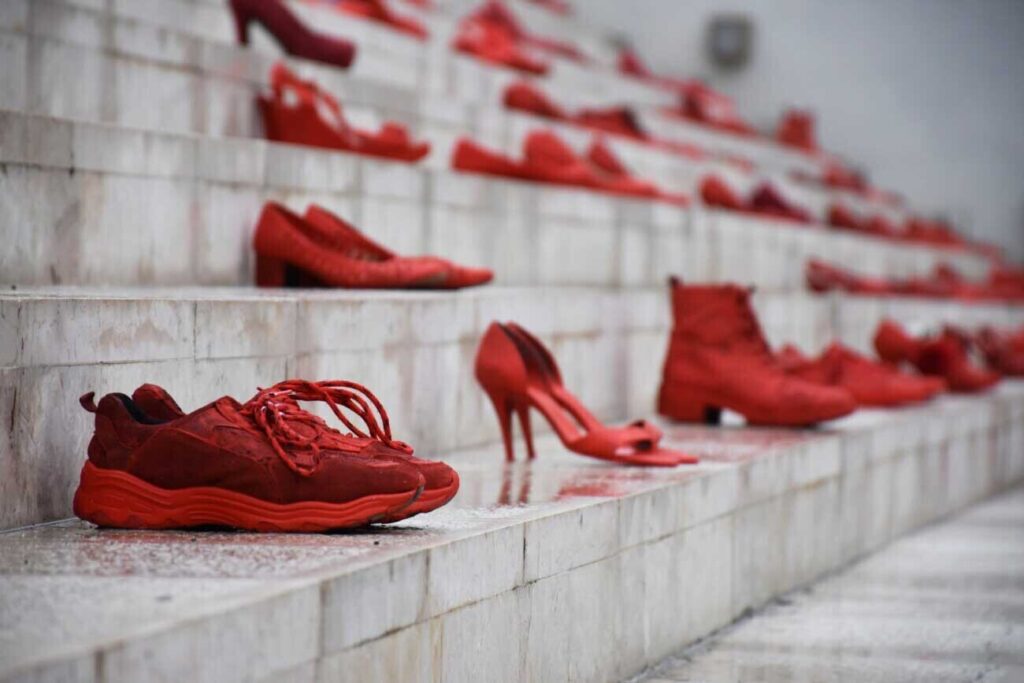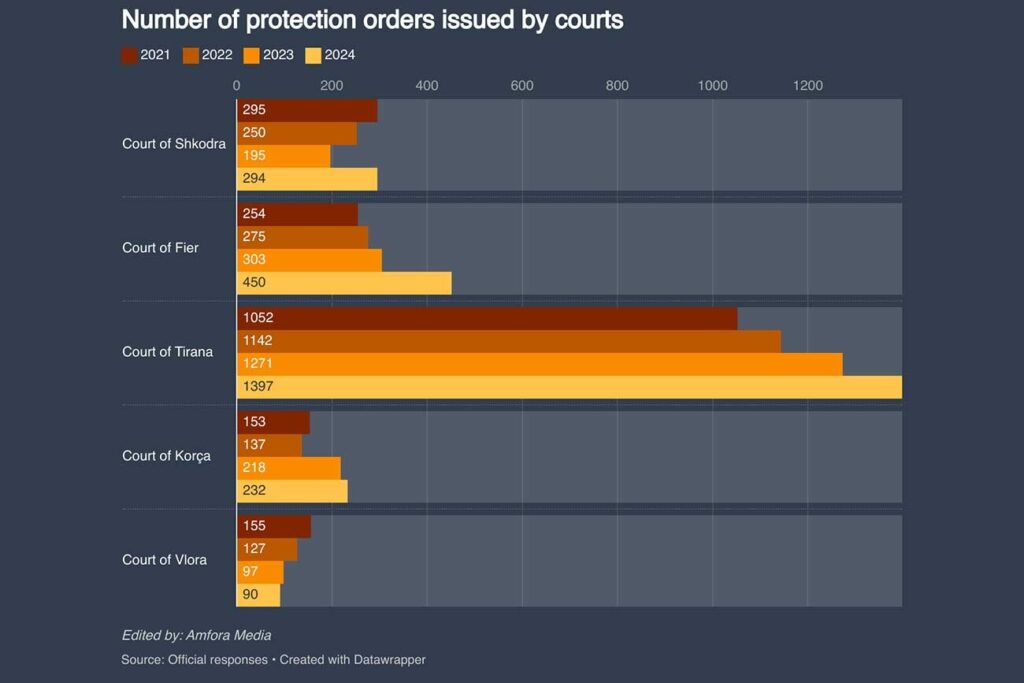Between silence and clicks: Technology is not helping the gender-based violence victims in Albania
Despite the increase in institutions treating domestic violence cases and the creation of awareness-raising apps which use high-end technology, women, and girls who are victims of gender-based violence in Albania struggle to find the right space to report violence through the internet.

Awareness campaigns against gender-based violence. Photo: Media Amfora
Elona, mother of three, after finishing her work, goes almost on a daily basis to her lawyer’s office or to the local association where she receives free psychological counseling due to the ordeal the violence from her husband has caused in her life.
“It’s been 10 years now that I have been experiencing violence from my husband. I suffered for a long time, and then I decided to denounce him for the very first time in 2021. Now it is part of my routine to go to the police station and the court on a regular basis,” said the 42-year-old woman to Amfora Media on the condition of anonymity.
Domestic violence remains a concerning phenomenon in Albania, where there is a rise in reported cases year after year. This is a sign of more awareness to report such cases; however, the denouncement methods remain mostly the same, with people going to institutions in person to report the cases. Meanwhile, the victims are not benefiting from the technological developments that facilitate legal procedures for reporting.
According to the General Directorate of State Police, from January to December 2024, 5445 domestic violence cases have been identified and treated by the police authorities, “among them, 3822 victims have been girls and women, and 1754 have been men”. The State Police figures analyzed by Amfora Media show that the number of girls and women who sought protection orders increased by 115 in a year.
In 2024, 2969 protection orders for domestic violence were issued, and among them, 2166 were for women and girls, whereas in 20223, there were 2772 protection orders of such nature, 2051 of which were for women and girls.
Amfora Media, through a questionnaire published on its website, asked the audience about the domestic violence phenomenon. A total of 34 people responded to this questionnaire, 10 of them were domestic violence victims, while 24 were relatives of the victims. Among the domestic violence victims, it results that out of 10 people who have experienced violence, 9 of them were women and 1 of them was a man, exposing their spouse, cohabitant, boyfriend, or brother as the perpetrators.
Among these victims, only half of them had denounced their case to the authorities, and 80% of them had denounced violence in person, by going to the police station or the prosecution’s office. When asked about online denouncement, none of them said to had heard of the ‘Rapo Shpëto’ app, built to facilitate the reporting of violence and trafficking cases.
For lawyers and legal experts representing gender-based violence, there is a diversity of domestic violence cases that end up at institutions’ doors or lawyers’ offices through meetings and in-person denouncements.
“In the last five years, I have followed over 300 gender-based violence cases in the city of Durres alone. They include a series of cases, from physical and psychological violence to sexual and economic violence,” lawyer Erisilda Shpata explained.
“Sociologist Entela Binjaku said for Amfora that, “gender-based violence knows no religion, ethnicity or social status”.
“This happens in a society where the models inherited from the past clash with modern behavioral models,” she added.
The women met during this investigation stated that the violence they experienced from their husbands was denounced after experiencing it for years. Such a thing happened due to the presence of children in their lives, their inability to raise them, and the hope that things would change over time.
“Now that I am recalling it, I can fully say that I was blind and I have judged myself for his actions in every swearing, offense and physical violence,” added Stela who works 11 hours a day to be economically independent and is successfully managing to raise her two daughters alone despite a series of hardships.
Domestic violence victims stated that they initially justified violence from their spouse due to the economic situation the family was experiencing. Apart from the family situation, Elona had to deal with her husband’s parents; however, after 10 years, she decided to denounce violence for the very first time.
“In 2021, the situation became unbearable. Children were growing up in between violence and depression, and I started to suffer when my daughter was still a minor. Then I decided to denounce violence, to flee home and go to a shelter for almost four months,” said the woman.
“Technology silences,” women mostly denounce violence at the police stations
Technology is advancing at a rapid pace, and despite the apps and online platforms which offer opportunities to people to express themselves and seek help, many women are still struggling due to the barriers of fear, lack of digital skills, and immediate support.
“During the summer of 2021, hell came to my home. My husband, who was drunk the whole time, blamed me for every family problem and exerted violence on me. His parents had a negative influence on him; the children were minors, and I had no other choice. I denounced him to the police station after 10 years of marriage,” recalled Elona with grief.

Stela, another woman from Durres who consented to be identified by her first name, recalled that she spent 10 years of her marital life under violence of all forms from her husband, who exerted violence over her, causing multiple psychological and physical traumas.
“Immediately after getting married, I experienced violence from my husband. Since he became father to my two daughters, I put up with him for a long time refusing my existence,” said the 46-year-old woman in shock.
For Stela, who is waiting for the court decision on the dissolution of her marriage, a process which has taken a full three years, the moments she decided to escape violence have never been easy.
“I initially got a protection order; however, after he left the house, I was left alone to feed my two girls, pay rent, and any take care of any other duties, hence it has been very difficult to go out,” she added.
The girls and women know and recognize the State Police as the best opportunity to denounce violence cases, even though the development of technology should have been accompanied by different forms of education and direct support to bring effective and accessible opportunities.
The Ministry of Interior and the Ministry of Justice passed accountability to the Ministry of Health and Social Protection, which listed a series of training activities organized for capacity building as well as awareness-raising campaigns. What was noticeable was the lack of a concrete online violence reporting mechanism.
It mentioned the “REVEALB” platform (an electronic system for registration, referral and monitoring of domestic violence cases from the local domestic violence coordinators), where from January to November 2024, a total of 595 cases of violence of have been reported, 513 of which were violence cases against girls and women. Nevertheless, this overview is filled in by social workers and it serves; it does not provide a direct communication channel to the victims of violence.
“The majority of the girls and women choose to head to the police stations, either in person or through their mobile phones,” lawyer Shpata elaborated.
Elona does not recall how many times she had to call the Durres Police to denounce the violence she experienced from her husband; however, she still recognizes it as the best opportunity to seek help there, highlighting that she always reports violence “through the police phone number”.
“I had memorized it, and when I decided to denounce him, it was the only thing that came to my mind. Even now, whenever I denounce my husband, I do so through the police, because help comes fast and is the only way I know,” Elona stated.
Around 80% of the Media Amfora questionnaire respondents stated that they went in person to the state police to denounce violence, while 20% had followed other procedures, such as directly denouncing violence to the prosecution and court, or having legal representation through civil society lawyers.
Violence remains “invisible” in rural areas
Mirela Gjoni, a gender equality activist since 2000 in Elbasan, noted that many women of this District struggle due to pressure and lack of access.
“Girls in the rural areas experience more pressure related to the patriarchal mindset compared to girls from the urban areas. Access to services is also limited, due to remoteness and lack of information in several cases. They have fewer economic opportunities because they do not manage agriculture revenues themselves,” Gjoni elaborated to Amfora.
Beyond Elbasan, in Pogradec, according to the local organizations, the girls and women experiencing domestic violence have no in-depth knowledge, even though they might have heard on TV or social media about the institutions that have the legal responsibility to come and help them.
“They have no in-depth or accurate knowledge regarding the pathways they can follow; however, they have information that there is a solution. They do not really know, hence awareness raising need to continue, because they do not know in practice nor do they understand how they should act through concrete steps,” explained ‘Unë Gruaja në Pogradec’ (Me the Woman in Pogradec) Center, which works for many years in the field of protecting girls and women.
The women met during the preparation of this article revealed that they have denounced the violence they have experienced from their spouses after living with it for many years due to the presence of children in their lives, their inability to raise them all by themselves, and the hope that things would change over time. The cases of violence that have ended up in court have increased considerably in recent years. The majority of such cases come from Tirana and Fier. A total of 254 protection orders were issued in the latter in 2020, whereas in 2024, the court in Fier issued 450 protection orders. Meanwhile, protection orders have decreased in Vlora from 157 issued in 2020 to 90 in 2024.

“Girls and women face many difficulties when it comes to reporting violence, due to the infrastructure. The phone is not very accessible, while transportation to the nearest police station or other institutions is almost impossible for them. Due to their isolation, they use social media very little,” Oliana Manaj from ‘Vatra’ Psychosocial Center in Vlora stated.
The analysis of the Amfora questionnaire showed that most of the victims of violence and their relatives had not heard of or used apps, hotlines, or other online reporting forms.
“Work on the ground shows that young girls who have more access to social media know several platforms where they can denounce violence, however not all of them use them because they are economically dependent on their husband/partners, as they do not have a profession and they have not worked in the past,” Oliana Manaj explained.
The Ministry of Health and Social Protection explained that it financially supports the functioning of 16 social services for domestic and gender-based violence victims, explaining that there are other forms of reporting violence through the phone.
“In the framework of the Social Fund, financial support has been provided for the establishment and functioning of 3 specialized centers on the regional level for violence victims. Throughout the years, these centers have treated, supported, and provided assistance to around 1165 beneficiaries, mostly girls and women,” the Ministry officially responded.
“Free online counseling services, reporting of violence and abuse against children, ‘Alo 116-111’, as well as the ‘Counseling hotline for Women and Girls’, victims from all forms of abuses and violence…”, ranked the ministry as some of the initiatives from Civil Society Organizations.
One of the victims reported to Amfora that she had heard about the violence reporting hotlines; however, they were not successful. “I have tried to reach the Durres Municipality helpline; however, it did not work,” explained the woman anonymously.
For sociologist Entela Binjaku, the services offered by the state institutions and the alternative mechanisms of reporting violence remain weak and need to be reformed.
“The time has come to focus on the quality of our actions, their sustainability, and the increase of social pressure toward the services offered by the state institutions, which seem to be weak and without an impact,” she stated.
From 2011, mechanisms have been established in 61 municipalities through officers who coordinate work with other institutions on the local level, such as the court, police, and different associations that come in support of domestic violence victims.
“Durres Municipality has a special helpline, the 0800 9888; however, from my experience and the experience of violence victims, this number does not work,” explained lawyer Erisilda Shpata, who has provided counseling and legal support to dozens of women in recent years.
Durres Municipality, apart from this unit of violence reporting, also has under its dependency 2 community centers which work on such issues. Even though in 2023 alone the Durres Police Station registered 231 cases of violence, none of them seems to have been in contact with these centers.
“No cases have been identified at the Nishtulla Community Center of the Rrashbull Community Center from January to December 2023,” Durres Municipality officially responded to Amfora.
Meanwhile, physical violence remains more prevalent. The victims’ relatives who reported to Amfora said that in 58% of cases, the violence was physical while in 38% of cases there was psychological violence and only 4.2% of cases were sexual violence.


